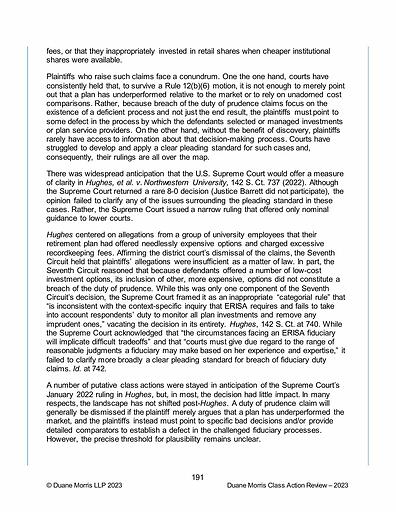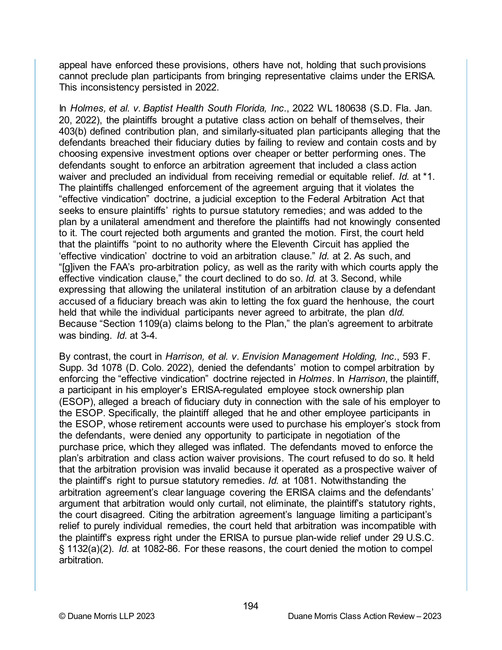Duane Morris Class Action Review - 2023 - Report - Page 193

The uncertain impact of Hughes is apparent in several subsequent decisions issued by
federal appellate courts in closely-watched cases. Shortly after Hughes, the Ninth
Circuit issued its decisions in Davis, et al. v. Salesforce.com, Inc., 2022 WL 1055557
(9th Cir. Apr. 8, 2022), and Kong, et al. v. Trader Joe’s Co., 2022 WL 1125667 (9th Cir.
Apr. 15, 2022), both of which reversed dismissals of duty of prudence claims in putative
class actions challenging defendants’ alleged failure to select lower cost mutual fund
share classes or other investment vehicles. In Davis, the Ninth Circuit reversed the
district court’s dismissal of the plaintiffs’ duty of prudence claim in a two-page opinion
that did not cite Hughes. Acknowledging the merit of the defendants’ arguments based
on judicially noticed documents refuting the plaintiffs’ allegations, the Ninth Circuit held
that “the judicially noticed document on which defendants rely . . . are not sufficient at
the pleading stage to render plaintiffs’ facially plausible allegations inadequate.” Davis,
2022 WL 1055557, at *1. The Ninth Circuit emphasized its obligation to accept the
plaintiffs’ other allegations as true at the pleading stage, concluding that the defendants’
explanations “cannot simply be deemed reasonable as a matter of law without further
factual development.” Id. at *2. For these reasons, the Ninth Circuit reversed and
remanded the dismissal.
The Ninth Circuit’s decision in Kong just one week later reached an identical result. In
an even shorter two-page decision that cited Hughes only for the limited proposition that
in evaluating breach of fiduciary duty claims, “the appropriate inquiry will necessarily be
context specific,” the Ninth Circuit again reversed a Rule 12(b)(6) dismissal. Kong, 2022
WL 1125667, at *1 (quoting Hughes, 142 S. Ct. at 742). Again emphasizing the
obligation to accept the plaintiffs’ allegations as true, the Ninth Circuit explained that the
“defendants’ explanation for the more expensive choice is unavailing at the pleadings
stage.” Id. Even “[t]hough the parties signed a revenue sharing agreement that might
provide some explanation for [the defendants’] choice,” the Ninth Circuit held that “the
agreement shows only what could occur in theory — not what occurred in fact.” Id. The
Ninth Circuit otherwise took the plaintiffs’ allegations as true and found that the district
court had erred in dismissing the plaintiffs’ claims.
Despite these almost perfunctory dismissals broadly deferring to the plaintiffs’
allegations at the pleadings stage, more recent post-Hughes appellate decisions have
provided defendants with a measure of hope. In Smith, et al. v. CommonSpirit Health,
37 F.4th 1160 (6th Cir. 2022), the Sixth Circuit affirmed dismissal of the plaintiff’s
complaint, which largely focused on her plan’s retention of allegedly underperforming
actively-managed funds. The Sixth Circuit was less deferential to the plaintiff’s
allegations, explaining that she did not “plausibly plead that this ERISA plan acted
imprudently merely by offering actively managed funds in its mix of investment options.”
Id. at 1165. “Nor does a showing of imprudence come down to simply pointing to a fund
with better performance.” Id. at 1166. The Sixth Circuit explained that while “pointing to
an alternative course of action . . . will often be necessary to show a fund acted
imprudently . . . that factual allegation is not by itself sufficient.” Id. Rather, a plaintiff
must present evidence “that an investment was imprudent from the moment the
administrator selected it, that the investment became imprudent over time, or that the
investment was otherwise clearly unsuitable for the goals of the fund based on ongoing
performance.” The Sixth Circuit reached a similar conclusion with regard to the plaintiff’s
192
© Duane Morris LLP 2023
Duane Morris Class Action Review – 2023













